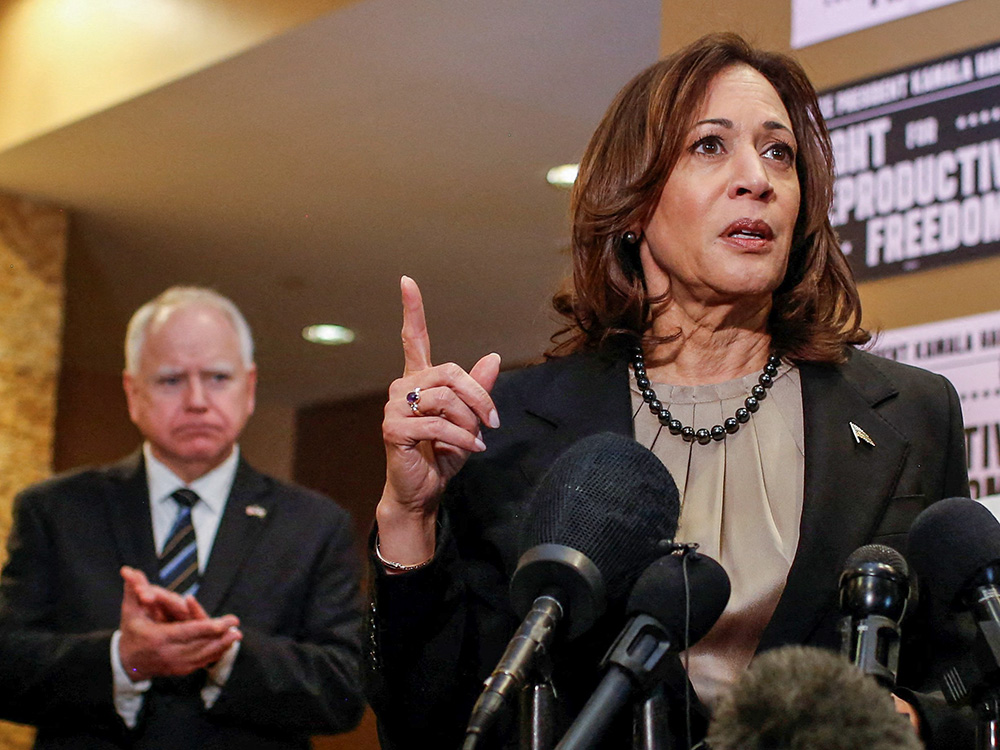
Minnesota Gov. Tim Walz visits Bemidji Steel Company in Bemidji, Minnesota, on July 1. (Wikimedia Commons/Office of Gov. Tim Walz & Lt. Gov. Peggy Flanagan)
Vice President Kamala Harris' choice of Minnesota Gov. Tim Walz as her running mate is not likely to make a huge difference in November, and it is far too soon to know what kind of influence Walz would have in a Harris administration should they win. The most important thing about the selection is what it tells us about Harris.
The American people are still getting to know Harris. This is her first presidential-level decision. Trying to read the tea leaves, the first conclusion to be drawn is that, like most politicians, Harris followed the medical dictum, "first, do no harm."
Walz, 60, is a relatively noncontroversial figure who is so well-liked by his fellow governors, he is chair of the Democratic Governors Association. Before running for governor in 2018, Walz represented Minnesota's 1st Congressional District, which he won in a squeaker in 2016, beating the Republican challenger by only 2,548 votes, after winning the district handily in 2014 with a margin of 19,315 votes. The district spans the southern border of Minnesota and includes large swaths of rural precincts.
Secondly, the other finalists for the post had liabilities Walz apparently does not. Organized labor had adopted an "anybody but Mark Kelly" stance and strategists were worried about losing Kelly's Senate seat in a future special election should Harris win.
Advertisement
Teachers' unions also had reservations about Pennsylvania Gov. Josh Shapiro due to his support for school vouchers. Shapiro also had a complicated, and ugly, situation regarding a former close aide who faced sexual abuse allegations. As we've learned in the church, anytime your name is in the same sentence with the phrase "sex abuse," you are going to have some bad press.
Shapiro was also the object of a shameful antisemitic attack. His opinions on the war in Gaza were not substantially different from those of other Democrats, but a vicious "No Genocide Josh" campaign started in some progressive circles.
Walz had none of these problems. Walz spoke at a synagogue in the days after the Oct. 7 pogrom. "If you did not find moral clarity on Saturday morning, and you find yourself waiting to think about what you needed to say, you need to reevaluate where you're at," Walz said. But he also endorsed calls for a ceasefire this spring. United Auto Workers President Shawn Fain had already named Walz as a top union pick.
More importantly, during a series of interviews in the past couple of weeks, Walz impressed Harris' team. "No one called Trump weird until Tim Walz did," former Sen. Heidi Heitkamp of North Dakota told the Guardian. "And it resonated for a reason, because he is weird. I mean, anyone who talks about Hannibal Lecter, that's not normal behavior. I think that there's been people who have tried to intellectualize Donald Trump, and Tim just cut through it all and said, 'This guy's not normal. This is weird.' "
I have my reservations about this line of attack, not least because in an age of conformity, weird should normally be applauded. But Walz needed to impress Harris, not me.

Minnesota Gov. Tim Walz looks on as Vice President Kamala Harris speaks as she visits an abortion clinic in Minneapolis March 14. (OSV News/Reuters/Nicole Neri)
Walz is not without his problems. In the days after the murder of George Floyd, riots in Minneapolis went on for three nights before the governor stepped in. "Let's be very clear: The situation in Minneapolis is no longer in any way about the murder of George Floyd. It is about attacking civil society, instilling fear and disrupting our great cities," Walz said in announcing he was sending in the National Guard.
In an interview with Politico, Walz detailed his decision-making process and it is clear he began with a collaborative approach, working with Minneapolis Mayor Jacob Frey, but when local authorities failed to get a handle on the rioting, he acted.
Walz's decision to literally send in the troops is being used against him by conservative critics. A Fox News report quoted David Hann, chairman of the Minnesota GOP: "Hann similarly said Walz 'waited for three days before he could bring himself to ask for the National Guard to be deployed.' " Then came the insinuation: "He also pointed to the 'defund' police movement's roots in Minnesota following Floyd's murder and subsequent rioting in the Twin Cities."
Roots? So, Walz is linked to the "defund the police" movement because it has roots in Minnesota? That is not causality. And, incidentally, the link doesn't work.
If there is a particular Catholic angle to Walz, I can't find it. St. Paul-Minneapolis Archbishop Bernard Hebda tussled with Walz about opening churches during the pandemic, but they worked it out and Hebda published a gracious letter on the topic. That's about it.
Again, what matters in this choice primarily is what it tells voters about Harris. She is cautious, wants to unite the party, and is mindful that there are millions of working-class voters in Middle America whose politics are different from the Northern California politics through which she climbed.
He has the added benefit that it is not clear he really saw any of this coming until about two weeks ago. Walz comes across as a real person, not a polled-out politician. Harris made a fine choice.







